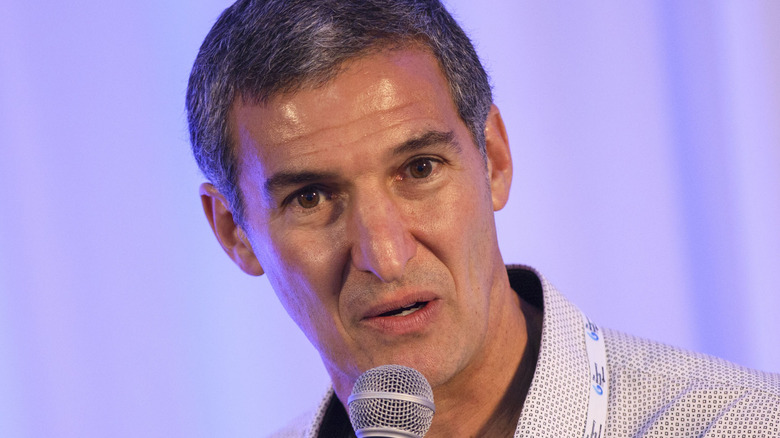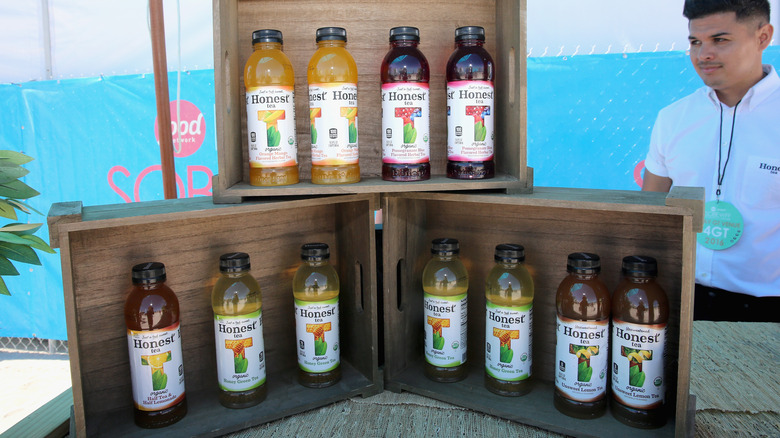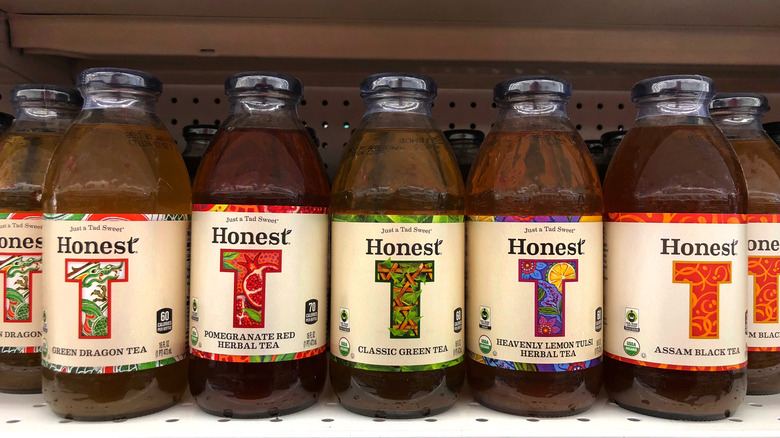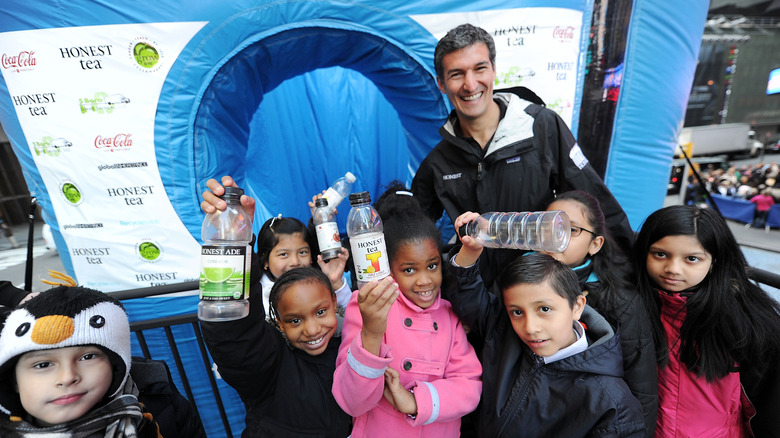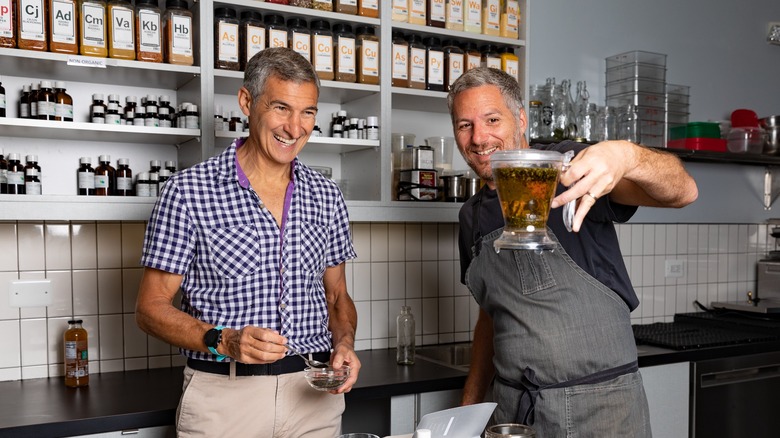Honest Tea Founder Seth Goldman On The Brand's End And What's Next - Exclusive Interview
When serial entrepreneur Seth Goldman founded Honest Tea in 1998, the brand was a change maker, shaking up the industry with its line of organic bottled teas. As the brand grew, it attracted outside attention, leading to Coca-Cola acquiring the company in 2011 and allowing Goldman to move on to other endeavors and groundbreaking food brands, such as Beyond Meat, Eat the Change, and Plant Burger. However, despite Goldman's relative distance from the brand at this point, when Coca-Cola announced its intention to discontinue the Honest Tea line in May 2022 and focus on its other tea brands, such as Gold Peak and Peace Tea, Goldman called the decision a "gut punch" on his personal Twitter.
It didn't take long for Goldman to spring into action following the announcement. Under the umbrella of his Eat the Change brand, he's ready to release a yet-to-be-named line of organic bottled teas in the Honest Tea vein, later this year. In an exclusive interview, Goldman told Mashed about the importance behind having a fair trade-certified, organic tea option on the marketplace and how he continues carrying the mission and purpose of the decades-old Honest Tea brand.
Honest Tea's tragic end
I know that Honest Tea has been a huge part of your life for a really long time, so how does it feel to see Coca-Cola discontinuing the brand at this point?
It's tragic. It's so sad — all the people, all the work, all the supply chains behind it, who really invested in it, these farms.
While we're talking, I'll pull up an email I got from one of our suppliers. It was heartbreaking to hear ... He said, "Honest Tea is very connected to our own gardens and people, so the news is definitely a gut punch for us as well. While the financial consequences are material, the loss of confidence in organic and fair trade agriculture that this decision is likely to engender in the wider community is very saddening and probably more consequential, especially in terms of lost motivation at origins. We've been so inspired to be part of the journey that you led and want to try to continue the effort and fight the suggestion that this was all a failed experiment."
It's like, oh my God, that's brutal, and I share those concerns. So, as you probably heard, we are not sitting by idly and watching that happen to these communities or to our consumers. That LinkedIn post that I put up a week ago got such a response and it is so gratifying to know. I mean, obviously it meant a lot to me, but it was gratifying to hear how much it meant to everybody — so, not everybody, [but] so many people. We'll be announcing next week that we are going back and going to be launching an organic bottle tea line.
I guess that answers the next question I had, which was whether or not you thought this would leave a pretty significant gap in the marketplace.
It will. It's the top brand in the natural channel. I was just in a new Whole Foods opening ... and this was the week before I got the news from Coca-Cola, and even though I'm no longer involved in the management of the brand, I get a little spring in my step when I see a nice shelf display. We had this beautiful display in this brand-new store and I'm like, "Wow, that's great," and then to hear that they were pulling out, like ... Whoa, wait, what?
The Honest Tea purpose
Backtracking a little bit, whenever I hear about Honest Tea, I always hear it described as a purpose-based brand. Can you tell me a little bit about that purpose?
It started out initially as just "less sweet" and there's purpose to that, because it means lower calorie and helping people avoid consuming too many liquid calories. That was the origin, and then we had some organic ingredients, but, in 1999, we were the first to launch organic bottled tea, based on the belief that [it] is better for the ecosystem, better for the people picking tea leaves, who were exposed to everything that's spread on the bushes, and also better for the consumer.
Then, in 2003, as we got closer to the supply chain, we also were the first to launch fair trade-certified bottled tea, and that's about empowering the workers in the gardens, the ones picking the tea leaves. It ... not [only] makes sure their working conditions are approved, meaning inspected, but also that a portion of the sales goes back for them to invest in their community as they deem appropriate.
That empowers the people in the gardens, because it gives them a source of extra funds and, in particular, empowers women, because most of the tea-pickers are women, so they, all of a sudden, have new resources that they would not have on their own. If they decide, "We want to spend this money on school or on eye care," their priorities may not always be aligned with the owners of the tea gardens, so it gives them a real, separate economic stake.
It sounds like the purpose grew and evolved over the years. Did you find that stayed the same after the Coke acquisition?
Absolutely. In fact, this is what's neat. When Coke invested in Honest Tea, back in 2008, about 40% of our line was fair trade-certified. It wasn't until 2011 that our entire line became fair trade-certified. We kept going deeper, and then in 2015 is when we got all the sugar to be fair trade-certified. We continued to deepen the mission and expanded it in terms of its reach and its breadth.
I read that you stayed involved with Coke until about 2019. At what point did you start shifting your attention away to the various other endeavors that you're involved with now?
Seth Goldman: In 2015, I shifted to a part-time role, where I was half-time with Honest Tea and half-time with Beyond Meat, as the executive chair of the board at the time. Then, in 2019, I left that entirely to start these new enterprises.
On to new ventures
Now you've got Beyond Meat, Eat the Change, and Plant Burgers, and then also this new beverage venture. What has you most excited?
The new beverage venture is part of Eat the Change. I'm excited about all of them, but Eat the Change is where I'm putting the most of my time. That's my job and, as CEO of it, I'm putting a lot of work into that.
I'm excited about all we're doing at Eat the Change. If we were talking two weeks ago, I would've been talking nonstop about our Carrot Chews, which we've just launched in the market, which are a carrot-based snack for kids. It really is the first of its kind. The goal there is to hopefully displace some of the candy that kids are eating at lunch that is disguised as what's called fruit snacks. They're really just gummies. We're thrilled with this product line. That's what I would be pushing and we still will be pushing it.
The whole mission of Eat the Change is to present people with more planet-friendly options and, based on what we know about the supply chain for Honest Tea, we believe that meets that standard as well. We're expanding the umbrella that Eat the Change covers, and this new line will be offered under the Eat the Change umbrella.
For people who are familiar with Honest Tea, how is the new organic bottled tea line going to differ or be similar to what they might know?
[It's] very similar. It's funny because, as we're going through it, we're [saying], "Well, we would love to do just green tea. We'll want to do something like that. Should we feel bad about copying what Honest Tea is?"
I said, "Well, we shouldn't feel bad about copying something we did."
There'll be some tweaks, for sure. My co-founder, Spike Mendelsohn, is a world-class chef. He'll have his hands on these, but we'll be looking to replicate. We know what the top sellers are and we know how to make them. We've heard such passion from our consumers about what they want to see on the shelf. We know the general orientation of what we'll be offering.
What's the timeline for launching this? When can people expect to find it in the stores? Will it be nationwide?
We're aiming for the fourth quarter of this year. They'll be available nationwide. We'll have to see how much we can scale up, and how quickly.
Supporting all things plant-based and fair trade
I also saw that in addition to Eat the Change, you also have the Eat the Change Impact Project. Can you tell me a little bit about what that is?
That's a grant program out of a separate pool of funds. It's not made by the company, but it's made in the company's same mission. We're going to be, as we have last year, giving out over $500,000 in grants to community-based nonprofits around the country that are working to democratize plant-based diets. It's all types of really neat organizations. We have, on our website, listings of all the ones we did last year.
Looking more broadly at the industry, since you're a serial entrepreneur in the food space, what are some of the challenges that you're seeing in the industry right now, as you look toward these new ventures?
The supply chain is challenging. We've seen a lot of issues with that. Trucking and labor are always challenges.
On the flip side, is there anything industry-wide that really excites you? Are you seeing any movements or trends that are really exciting right now?
I'm a firm believer in the continued growth of plant-based options. I feel like consumers are continually moving that way. With respect to organic, I still think that's an area of growth and opportunity. I 1,000% reject that notion that [it] somehow that was a failed experiment. It's a long-term direction where consumers will be headed.
Is there anything else that our readers might want to know about the new organic bottled tea line?
Stay tuned for more details. Two weeks ago, it was not something we were contemplating. Now we are, and we'll move fast. For us, fair trade will be a critical part of that.
For the consumer, why is [the fair-trade aspect] something they should care about?
First of all, it's about transparency and helping people understand ... One of the things Eat the Change is all about is helping connect people to connect their diets to their concerns about the world. A lot of times [when] you buy something, you have no idea who's behind it or what's going on. What fair trade does is provide that window, but it also provides a third-party verification and audit on the working conditions. You hear these stories — whether it's about sweat shops or child labor or any of those things — and most people, not all, but many people don't want to be part of that. [We want] to help people understand that when it's something fair trade-certified, there are people paying attention to how those products are made.
The other thing is — even from a climate perspective, this is an unanticipated benefit of fair trade — a lot of the resources that we have given over the years to these communities is directed towards education, and what that often means is it's educating young women and girls and keeping them in school longer, and all of the research shows that when they stay in school longer, they have fewer children later in life. To the extent overpopulation is a concern, it really helps to address that.
Keep up to date on all things Eat the Change and watch for more information about Seth Goldman's upcoming tea line on the Eat the Change website.
